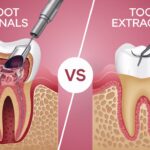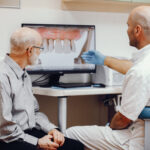The only way to treat natural antibiotics for tooth infection symptoms, gum abscess home treatment, or an infected tooth is through reliable antibiotics and professional dental treatment. If you don’t get your infected tooth examined by a dentist, the infection may eventually spread into the pulp chamber, gums, roots, or your bloodstream, leading to severe complications.
The only way to treat a tooth infection is through dental treatments, but some home remedies for an abscessed tooth can provide pain relief in the meantime. This article aims to describe how a tooth infection is treated by a dentist and the home remedies for tooth infection you can use for pain relief from the infected tooth or abscessed gums. When facing a tooth infection, consulting a dentist is crucial for prescribing the right antibiotic. Ensure effective treatment by seeking professional guidance for an appropriate antibiotic for tooth infection.
How will a dentist treat a tooth infection?
During your dental examination, the dentist will carefully examine your tooth infection, surrounding gums, and other dental structures. The dentist may also administer digital x-rays and other diagnostic tests to visualize the underlying bone structures and dental anatomy. The dentist will curate a treatment plan based on the location and region of the tooth infection.
If the tooth infection is contained in the enamel, leading to dental cavities, the dentist will simply remove the infected parts of the tooth and provide a tooth-colored filling. Composite resin fillings look just like natural remedies for tooth infection and cover up the cavity left behind by the tooth infection, preventing further bacterial infection and decay in the same region.
If the tooth infection has spread into the tooth’s pulp chamber, the dentist may need to perform a root canal. The pulp chamber is the internal structure of the tooth, housing the soft tissues and nerves. Most people suffer from tooth infections in the pulp chamber if a superficial cavity has gone unchecked or unidentified for too long, which happens when you don’t go for regular dental exams.
The best treatment for infected pulp tissues is a root canal. During a root canal procedure, the dentist drills an access hole into the affected tooth to remove all the infected pulp tissues and dead nerves. Once the pulp tissues and nerves are removed, the dentist disinfects the tooth, cleans its insides, and places a filling to cover it up. The dentist also recommends a dental crown to protect the weakened tooth from further damage.
A root canal is one of the most effective treatments for an infected tooth because it removes all the infected components, prevents the infection from spreading, and preserves the original tooth. However, if your tooth infection spreads even further or produces a gum abscess, you may need even more invasive procedures or surgical intervention to protect the tooth from complete decay.
What are the symptoms of a tooth infection?
- Severe and persistent toothaches.
- Toothaches that spread into the jawbone, neck, and other parts of your face.
- Extreme sensitivity to hot and cold temperatures.
- Extreme pain while chewing and biting.
- Toothaches accompanied by fevers.
- Swollen face and cheeks.
- Swollen lymph nodes under the jaws.
- Visible gum abscess at the tooth’s root.
- Difficulty while breathing and swallowing.
- Foul taste and scent in your mouth.
What is the treatment for tooth infection at home?
As mentioned previously, an infected tooth is a serious matter that should only be treated by professional dentists. At-home remedies can provide temporary pain relief from the tooth infection, but they can’t treat the infection itself or prevent it from spreading. However, the following are some steps you can take for tooth abscess pain relief fast.
Saltwater Rinse
Dentists often recommend rinsing your mouth with salt water after root canals and other dental treatments because it minimizes the risk of bacterial infection. While saltwater rinsing won’t stop the infection, it can provide temporary pain relief and aid in wound recovery. You should rinse your mouth with a solution of 1/2 teaspoon of table salt mixed with 1/2 teaspoon of warm water. Rinse your mouth thoroughly and spit it out.
Baking Soda
Baking soda doesn’t treat a bacterial infection, but it has antibacterial properties that provide temporary relief. It’s also effective at plaque removal, so you can use baking soda in your regular dental hygiene to minimize the risk of bacterial accumulation. To rinse your mouth with baking soda, you must mix 1/2 tablespoon of baking soda with the same quantity of water and a pinch of salt. You should rinse your mouth for up to five minutes.
Hydrogen Peroxide
Hydrogen peroxide has shown considerable antibacterial properties, making it a popular disinfectant for people with open wounds. Besides disinfecting wounds, hydrogen peroxide also removes plaque and tartar from your mouth. After getting a 3% hydrogen peroxide from your neighborhood drugstore, you should mix it with some water and rinse a few times a day. Mixing the hydrogen peroxide with water is crucial because it can harm your gum tissues in its concentrated state. You must also avoid swallowing it.
Over-the-Counter Painkillers
Over-the-counter painkillers can’t treat or even reduce bacterial infection, but they can provide immediate pain relief. You can get pain medications found in your drug store for immediate but temporary relief.
How can dental insurance help?
Dental insurance plans usually cover parts of most dental treatments necessary for tooth infection treatments. However, the specific details of the coverage depend on your specific situation, the necessary treatment, and the insurance plans.
Conclusion
Tooth infection is a serious dental problem with severe long-term complications, such as tooth loss bone loss, gum damage, heart conditions, etc. Natural home remedies can’t treat tooth infection, but they can minimize the pain and discomfort. If you notice the signs and symptoms of tooth infection, please contact the dentists at URBN Dental for immediate diagnosis and treatment.















